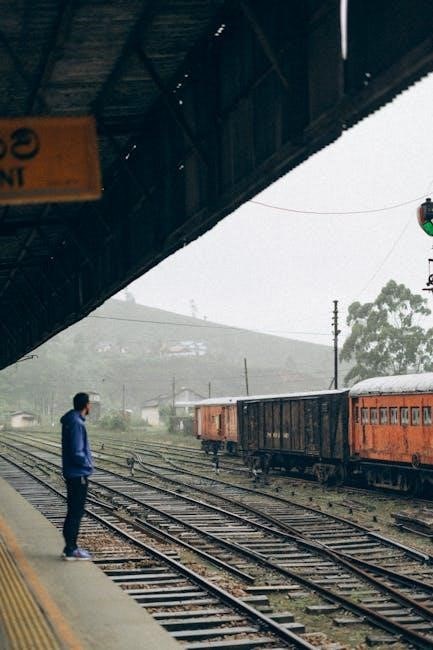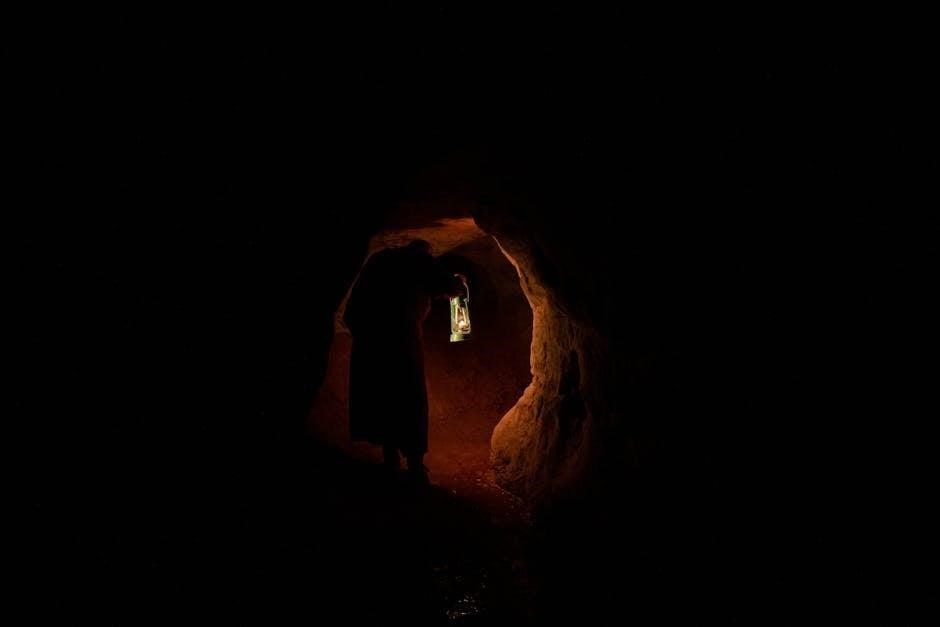
Thailand’s sex industry is a complex and controversial sector, deeply rooted in cultural, economic, and social dynamics․ Despite its illegality, it thrives openly, catering to both locals and tourists, generating significant revenue while raising ethical concerns about exploitation and human rights․
The industry’s visibility and scale, particularly in cities like Bangkok and Pattaya, highlight its paradoxical status as a thriving yet controversial part of Thai society, shaped by historical and modern factors․
1․1 Overview of the Sex Trade in Thailand
Thailand’s sex trade is a multibillion-dollar industry, operating openly despite legal restrictions․ It encompasses brothels, go-go bars, and street prostitution, catering to both locals and tourists․ Major cities like Bangkok and Pattaya are hubs, with vibrant nightlife attracting global attention․ The industry employs hundreds of thousands, often migrants from rural areas, and plays a significant role in the economy while remaining a contentious issue due to ethical and legal concerns․
Its persistence reflects a societal paradox, where it is widely accepted yet officially condemned, fueling debates on legalization and human rights․
1;2 Historical Context of Prostitution in Thailand
Prostitution in Thailand has deep historical roots, with evidence of its existence dating back to ancient times․ The industry grew significantly during the Vietnam War, catering to American soldiers, and later expanded due to tourism․ Cultural attitudes and economic necessity have perpetuated the trade, despite legal restrictions․ The 1996 Prevention and Suppression of Prostitution Act attempted to regulate it, but the industry remains a persistent and controversial part of Thai society;
Its evolution reflects a blend of cultural tolerance and economic drivers, shaping its modern form․

Legal Framework and Regulations
Thailand’s sex industry operates under a complex legal framework, with prostitution itself not illegal but related activities like solicitation and brothel-keeping prohibited under the 1996 Prevention and Suppression of Prostitution Act․
2․1 Prostitution Laws in Thailand
Prostitution in Thailand is legally complex; while the act itself isn’t illegal, activities like solicitation, operating brothels, and pimping are criminalized under the 1996 Prevention and Suppression of Prostitution Act․ Public solicitation is prohibited if deemed shameless or disruptive․ Despite this, the sex trade thrives openly, reflecting a disconnect between laws and enforcement, with many establishments operating under the guise of legitimate businesses like massage parlors or bars․
2․2 Enforcement of Anti-Prostitution Laws
Enforcement of anti-prostitution laws in Thailand is inconsistent, with authorities often turning a blind eye to the sex trade․ While occasional raids and crackdowns occur, especially in high-profile areas, many establishments continue to operate openly․ Corruption and economic dependencies perpetuate this leniency, allowing the industry to persist despite legal prohibitions․ This selective enforcement highlights the gap between legislation and practice, influenced by both cultural norms and financial interests․

The Sex Industry in Major Cities
Thailand’s sex industry thrives in cities like Bangkok, Pattaya, and Chiang Mai, with vibrant nightlife and tourist-driven demand fueling its growth and economic influence․
3․1 Bangkok’s Red-Light Districts
Bangkok’s red-light districts, such as Patpong, Nana, and Soi Cowboy, are iconic hubs for Thailand’s sex industry, offering a mix of go-go bars, nightclubs, and massage parlors․ These areas attract both locals and tourists, creating a vibrant yet controversial nightlife scene that contributes significantly to the city’s economy․ Despite legal ambiguities, they operate openly, reflecting the complex interplay of culture, tourism, and regulation in Thailand․
3․2 Pattaya’s Nightlife and Sex Tourism
Pattaya is renowned for its vibrant nightlife and sex tourism, with areas like Walking Street and Soi Buakhao serving as hubs for bars, nightclubs, and entertainment venues․ The city attracts both domestic and international visitors, offering a diverse range of activities that cater to various preferences․ Pattaya’s sex tourism contributes significantly to its economy, despite efforts to rebrand the city as a family-friendly destination․ Its reputation as a party hotspot endures․
3․3 Chiang Mai’s Emerging Sex Industry
Chiang Mai, a cultural hub in northern Thailand, is witnessing a growing sex industry, though smaller in scale compared to Bangkok and Pattaya․ The city’s nightlife is evolving, with bars and entertainment venues catering to both locals and tourists․ While less overt, Chiang Mai’s sex industry is increasingly visible, driven by tourism and economic opportunities, blending modern trends with traditional influences, though it remains less prominent than its southern counterparts․

Types of Sex Work in Thailand
Thailand’s sex industry includes brothels, massage parlors, go-go bars, street prostitution, and online-based services, catering to diverse clienteles and operating both overtly and discreetly across the nation․
4․1 Brothels and Massage Parlors
Brothels and massage parlors are prominent in Thailand’s sex industry, offering sexual services discreetly․ Many operate under the guise of legitimate businesses, catering to both locals and tourists․ These establishments often provide a range of services, from traditional massages to more explicit offerings․ Despite their prevalence, they remain largely unregulated, contributing to the industry’s underground nature while generating significant revenue in cities like Bangkok and Pattaya․
These venues play a crucial role in the economy, employing thousands and attracting international clientele, yet they often exist in a legal gray area, fostering debates about their societal impact․
4․2 Go-Go Bars and Nightclubs
Go-go bars and nightclubs are iconic in Thailand’s nightlife, offering vibrant entertainment and sexual services․ These venues, concentrated in cities like Bangkok and Pattaya, feature performers and hostesses who engage with clientele․ They serve as major tourist attractions, blending music, dance, and adult entertainment․ While they boost local economies, concerns persist about exploitation and human trafficking within these establishments, highlighting the industry’s complex ethical landscape․
These venues remain central to Thailand’s nightlife culture, attracting both locals and international visitors, despite ongoing debates about their societal impact․
4․3 Street Prostitution
Street prostitution in Thailand is less visible than in the past due to police crackdowns, but it still exists in major cities․ Sex workers often operate discreetly, avoiding direct solicitation to evade legal consequences; This form of sex work is risky, with workers facing exploitation and violence․ Despite the dangers, many engage in street prostitution due to economic necessity, highlighting the industry’s complex relationship with poverty and survival․
Street workers are vulnerable to arrest, abuse, and health risks, yet they continue to be a part of Thailand’s sex industry, reflecting broader societal and economic challenges․
Economic Impact of the Sex Industry
The sex industry significantly contributes to Thailand’s economy, generating billions annually through tourism and related businesses․ It supports employment for many, particularly from rural areas, though concerns about exploitation persist․
5․1 Contribution to Thailand’s Economy
Thailand’s sex industry contributes significantly to the economy, generating an estimated multi-billion baht annually․ It fuels tourism, creating jobs in hotels, bars, and entertainment venues․ The sector also supports informal workers like street vendors and taxi drivers․ Despite being unregulated, its economic impact is substantial, offering livelihoods to many, particularly in rural areas with limited opportunities․ This hidden economy plays a crucial role in sustaining local communities and boosting national revenue․
5․2 Employment Opportunities in Rural Areas
The sex industry provides vital employment opportunities in rural Thailand, where traditional farming and labor offer limited income․ Many individuals migrate to urban centers like Bangkok and Pattaya, drawn by higher earnings in bars, massage parlors, and entertainment venues․ This migration supports families back home, alleviating poverty and funding education and healthcare․
Rural areas benefit significantly as remittances from sex workers sustain local economies, highlighting the industry’s role in addressing regional disparities and fostering economic stability․
Sex Tourism in Thailand
Thailand’s sex tourism attracts millions annually, drawn by its vibrant nightlife, go-go bars, and massage parlors․ Pattaya and Bangkok are key destinations, blending cultural charm with explicit entertainment, fueling a multibillion-dollar industry that remains controversial yet deeply ingrained in the nation’s economy and identity․
6․1 Tourist Attractions and Sex Industry
Thailand’s vibrant tourist attractions, such as Pattaya’s Walking Street and Bangkok’s nightlife, are deeply intertwined with its sex industry․ These destinations offer a mix of cultural experiences and explicit entertainment, catering to both local and international visitors․ The industry thrives in areas like go-go bars, massage parlors, and beachside resorts, blending seamlessly with the country’s laid-back charm․ Despite its controversial nature, the sex industry remains a significant draw, contributing to Thailand’s reputation as a destination for diverse desires․
6;2 Role of Sex Tourism in the Economy
Sex tourism plays a significant role in Thailand’s economy, generating billions of baht annually․ Cities like Pattaya and Bangkok thrive on this industry, with revenue flowing into hotels, bars, and entertainment venues․ The sector provides employment for thousands, particularly in rural areas, and indirectly supports local businesses․ Despite its controversial nature, sex tourism remains a vital economic driver, attracting millions of visitors and contributing to Thailand’s tourism-dependent economy․

Health and Safety Concerns
The sex industry in Thailand faces significant health risks, including high rates of HIV/AIDS and STIs․ Many sex workers lack access to adequate healthcare and safety measures, exacerbating these challenges․
7․1 HIV/AIDS and STIs in the Sex Industry
HIV/AIDS and STIs are significant health challenges in Thailand’s sex industry․ Many sex workers face barriers to accessing healthcare, leading to higher infection rates․ Condom use varies, and stigma often prevents workers from seeking treatment․ Outreach programs and NGOs play a crucial role in providing education, testing, and care, but gaps remain, particularly in rural areas and among marginalized groups․
7․2 Safety Measures for Sex Workers
Sex workers in Thailand face significant safety risks, with limited legal protection․ NGOs and advocacy groups provide support, including access to health services and legal aid․ Police crackdowns often target workers, exacerbating vulnerabilities․ Many incidents of violence and exploitation go unreported due to stigma and fear of repercussions․ Efforts to decriminalize the industry aim to improve safety and reduce risks for those involved․
Human Trafficking and Exploitation
Human trafficking in Thailand remains a severe issue, often linked to the sex industry․ Thousands, including minors, are exploited due to poverty and inequality․ Efforts to combat trafficking are ongoing, but challenges persist in protecting victims and prosecuting offenders․
8․1 Prevalence of Human Trafficking
Human trafficking persists as a critical issue in Thailand, with victims often forced into the sex industry․ Despite legal measures, poverty and inequality drive exploitation․ Authorities report increasing cases, particularly involving migrant workers and minors․ The sex trade’s underground nature complicates efforts to track and rescue victims, highlighting the need for stronger enforcement and international collaboration to combat this growing problem effectively․
8․2 Efforts to Combat Trafficking
Thailand has implemented various measures to tackle human trafficking, including stricter laws and collaborative efforts with NGOs․ Law enforcement operations have increased, targeting brothels and illegal establishments․ Awareness campaigns aim to educate vulnerable populations and tourists․ International partnerships also play a role in addressing cross-border trafficking issues․ These efforts reflect a growing commitment to protecting victims and holding perpetrators accountable, though challenges remain in achieving long-term success․

Social and Cultural Perspectives
Thailand’s sex industry exists amidst contrasting societal norms, where conservatism and religious influences coexist with a thriving, albeit underground, sex trade․ This reflects a complex cultural acceptance of prostitution as a means of economic survival, despite legal and moral ambiguities․
9․1 Societal Views on Prostitution
Thai society exhibits a paradoxical stance on prostitution, blending cultural conservatism with widespread acceptance born of economic necessity․ Many view it as a moral issue, yet the industry thrives due to societal tolerance and demand․ Religious and cultural norms often conflict with the reality of sex work, which remains stigmatized yet deeply ingrained in the economy․ NGOs and activists advocate for rights, challenging outdated perceptions and pushing for change in this complex landscape․
9․2 Religious and Cultural Influences
Thailand’s predominantly Buddhist culture shapes societal attitudes toward prostitution, with religious teachings often condemning the practice․ However, cultural tolerance and economic realities create a paradox, allowing the industry to thrive despite moral stigma․ Many Thais view sex work as a necessary evil, influenced by traditional values and the belief in “merit-making․” Religious and cultural norms contribute to the taboo surrounding prostitution, yet acceptance persists, reflecting a complex interplay of faith, culture, and practicality․

Movement for Decriminalization
Thailand’s sex workers and activists are pushing for decriminalization to improve working conditions and rights․ The movement aims to modernize laws and reduce stigma, gaining political support․
10․1 Advocacy for Sex Workers’ Rights
Advocates in Thailand are tirelessly campaigning for the rights of sex workers, focusing on legal reforms to end stigma and exploitation․ They emphasize the need for safe working conditions, fair wages, and access to healthcare․ By challenging outdated laws, these efforts aim to empower sex workers and promote their dignity in a society where their profession remains controversial yet prevalent․
10․2 Political Efforts to Reform Laws
Efforts to reform Thailand’s prostitution laws are gaining momentum, with advocates pushing for decriminalization to protect sex workers’ rights․ Proposals include repealing the 1996 Prevention and Suppression of Prostitution Act and introducing regulations to ensure safe working conditions and fair wages․ However, political progress is slow due to societal resistance and conservative influences, highlighting the challenges in modernizing laws to reflect the industry’s reality․
Recent legislative discussions aim to balance public morals with the rights of sex workers, addressing exploitation and trafficking while acknowledging the industry’s economic significance․ These efforts reflect a growing recognition of the need for legal frameworks that prioritize human rights and safety in Thailand’s sex industry․

The Role of NGOs and Activists
NGOs and activists play a crucial role in supporting sex workers, advocating for their rights, and campaigning against exploitation․ They provide health services, legal aid, and push for policy changes to protect workers and combat trafficking, aiming to improve conditions and ensure safer environments within Thailand’s sex industry․
These organizations also raise awareness about the challenges faced by sex workers, promoting a more equitable and just system that respects human rights and dignity․
11․1 Support for Sex Workers
NGOs provide vital support to sex workers, offering health services, HIV testing, and access to contraception to ensure their well-being․ These organizations also advocate for safer working conditions and legal protections, empowering workers to assert their rights and report abuses without fear of retaliation or stigma․
Additionally, activists and organizations supply legal aid, counseling, and education, helping sex workers navigate systemic challenges and gain financial independence, ultimately aiming to improve their quality of life and societal acceptance in Thailand․
11․2 Campaigns Against Exploitation
NGOs and activists actively campaign against exploitation in Thailand’s sex industry, focusing on ending human trafficking and protecting vulnerable workers․ They raise awareness about abusive practices and advocate for stronger legal protections, while also pushing for policy reforms to address systemic issues perpetuating exploitation․
These efforts include collaborating with international organizations to combat trafficking and launching public campaigns to educate both locals and tourists about ethical practices, aiming to create a safer environment for sex workers and hold perpetrators accountable for exploitation․
Media Representation and Public Perception
Thailand’s sex industry is often sensationalized in media, shaping public perception as both controversial and complex, while societal views remain divided between cultural norms and economic reality․
Despite its prevalence, the industry’s portrayal in media and public discourse often fuels debates about morality, legality, and human rights, drawing significant global attention and scrutiny․
12․1 Media Coverage of the Sex Industry
Media coverage of Thailand’s sex industry varies widely, ranging from exposés on human trafficking to sensationalized portrayals of nightlife․ Documentaries often highlight the contradictions between the industry’s illegality and its economic significance․ Recent reports have sparked outrage, particularly those addressing exploitation and abuse, while others focus on the cultural normalization of sex work․ The industry’s portrayal in media often oscillates between criticism and fascination, reflecting its complex societal role․
Despite the controversy, media coverage frequently underscores the industry’s resilience and its deep-rooted presence in Thai society, raising questions about ethical journalism and public perception․
12․2 Public Opinion on Prostitution
Public opinion on prostitution in Thailand is deeply divided․ While some view it as a necessary evil due to its economic benefits, others condemn it for moral and cultural reasons․ Many Thais, particularly younger generations, advocate for decriminalization, while conservative groups strongly oppose it․ The industry’s visibility and societal acceptance coexist with stigma, reflecting Thailand’s complex cultural and economic reliance on the sex trade․

The Future of Thailand’s Sex Industry
The future of Thailand’s sex industry remains uncertain, with ongoing debates over legal reforms and shifting tourism trends․ Advocates push for decriminalization to improve safety and rights․
13․1 Potential Legal Reforms
Thailand’s sex industry may see legal reforms aimed at decriminalizing sex work, improving worker safety, and combating trafficking․ A proposed repeal of the 1996 Prostitution Act could legitimize the industry, offering protections and benefits to sex workers․ Advocates argue this change would reduce exploitation and enhance human rights, though conservative opposition remains a significant hurdle․
13․2 Impact of Changing Tourism Trends
Shifting tourism trends, including a rise in eco-tourism and cultural travel, may reduce reliance on Thailand’s sex industry․ Post-pandemic travelers prioritize sustainability and ethical practices, potentially diminishing demand for sex tourism․ This shift could pressure the industry to adapt, offering alternative livelihoods for workers․ However, economic dependencies on the sector may slow this transition, as it remains a significant revenue source․
Thailand’s sex industry remains a contentious yet integral part of its economy and culture, balancing economic benefits with ethical dilemmas and human rights challenges․
14․1 Summary of Key Points
Thailand’s sex industry is a paradoxical sector, operating illegally yet openly, contributing billions to the economy while facing ethical and legal challenges․ It caters to both locals and tourists, with major hubs in Bangkok, Pattaya, and Chiang Mai․ Despite its economic significance, the industry grapples with exploitation, human trafficking, and health concerns․ Efforts to decriminalize sex work and improve workers’ rights are ongoing, supported by NGOs and activists advocating for change․
14․2 Final Thoughts on the Industry
Thailand’s sex industry remains a contentious issue, balancing economic benefits with ethical dilemmas․ While it provides livelihoods for many, especially in rural areas, concerns over exploitation and trafficking persist․ Advocacy for decriminalization and improved regulation could address these challenges, fostering a safer environment for workers․ The industry’s future hinges on balancing cultural norms, legal reforms, and human rights, ensuring dignity and protection for all involved․

Resources and Further Reading
Explore reports on Thailand’s sex industry, including studies on human rights, economic impacts, and NGO efforts․ Visit organizations like the Global Network of Sex Work Projects for insights․
15․1 Recommended Articles and Studies
Explore insightful reports like “Prostitution in Thailand” by E․ Ayres (1994) and DW’s documentary on Pattaya’s sex tourism (2023)․ Studies on human rights and economic impacts are crucial․ The Global Network of Sex Work Projects offers detailed analyses․ For deeper understanding, refer to academic journals and NGO publications focusing on Thailand’s sex industry, human trafficking, and legal reforms․
15․2 Organizations Supporting Sex Workers
Organizations like the Empower Foundation and SWING (Sex Workers in Group) advocate for rights and provide support․ They offer health services, legal aid, and vocational training․ These groups aim to empower sex workers, challenge stigma, and promote safer working conditions․ Their efforts are vital in addressing exploitation and fostering resilience within the community, ensuring a safer and more equitable future for those involved in the industry;


